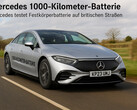Solid-state batteries are considered a key technology for the next generation of electric cars, e-bikes and even stationary energy storages. BASF and Beijing Welion New Energy Technology, and their joint venture BASF Shanshan Battery Materials (BSBM), have now reported a significant breakthrough. The first mass-produced cathode active materials (CAM) for semi-solid-state batteries have been delivered. Just twelve months after the project began in August 2024, this could accelerate the industrialization of solid-state batteries.
New materials for more performance
The new cathode materials combine a high nickel content with a special composite coating. This reduces interface problems between the cathode and the solid electrolyte. According to BASF, this leads to higher capacity, lower resistance, and improved cycle stability. Side reactions at the interface are suppressed, which extends the lifespan.
From concept to serial production
BSBM CEO Desmond Long describes this step as a:
milestone for our battery materials business and a significant step forward in the field of Solid-State batteries
The quick implementation illustrates the intense competition regarding the mass production of solid-state batteries.
Welion opts for semi-solid-state batteries
Welion is a leader in the development of solid-state batteries and plans to use BASF’s materials in its next generation of semi-solid-state battery cells.
According to Welion GM Jin Xiang:
As a leading manufacturer in the Solid-State battery industry, WELION will use BASF’s cathode materials in our new generation of Semi-Solid-State batteries.
These batteries are intended for electric cars, stationary storage solutions and other use cases.
Proper solid-state battery still in development
Pure solid-state batteries are still in development at this point in time. However, the aforementioned semi-solid-state variants are the foundation for the upcoming mass production of the full-fledged solid-state versions. BASF and Welion show that the industry is working on more powerful and safer solid-state batteries for EVs and other devices.





















